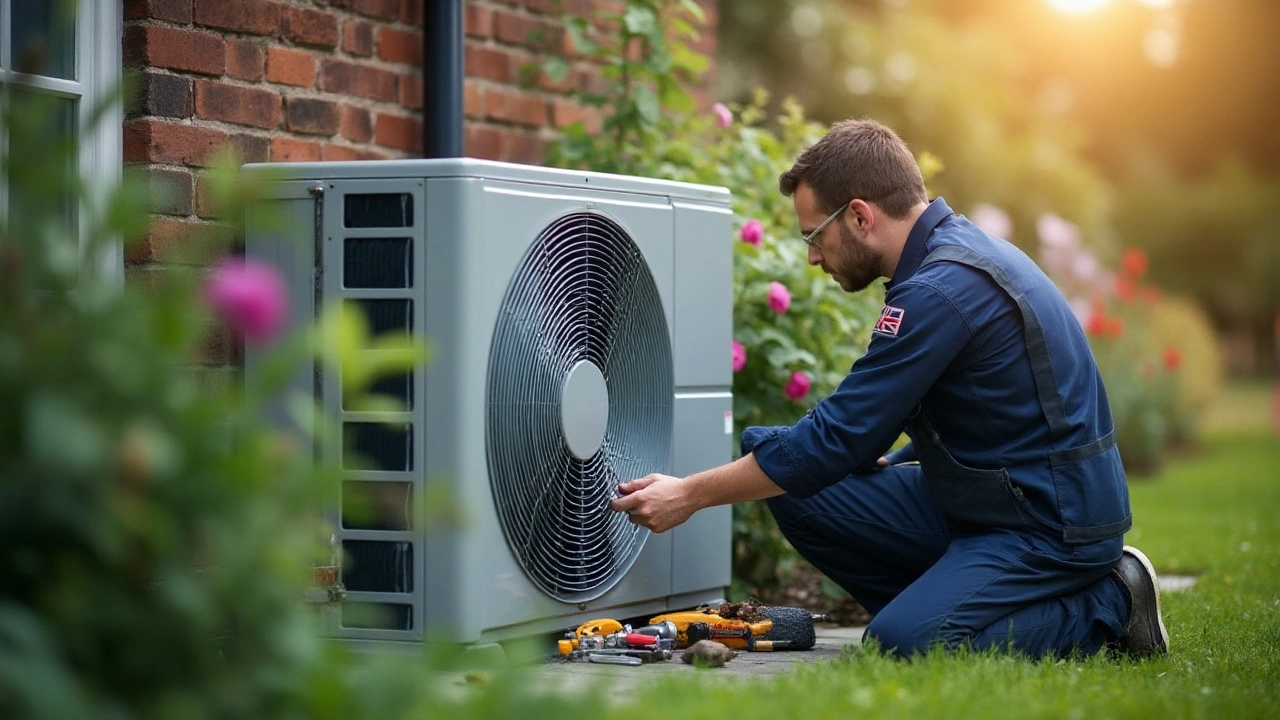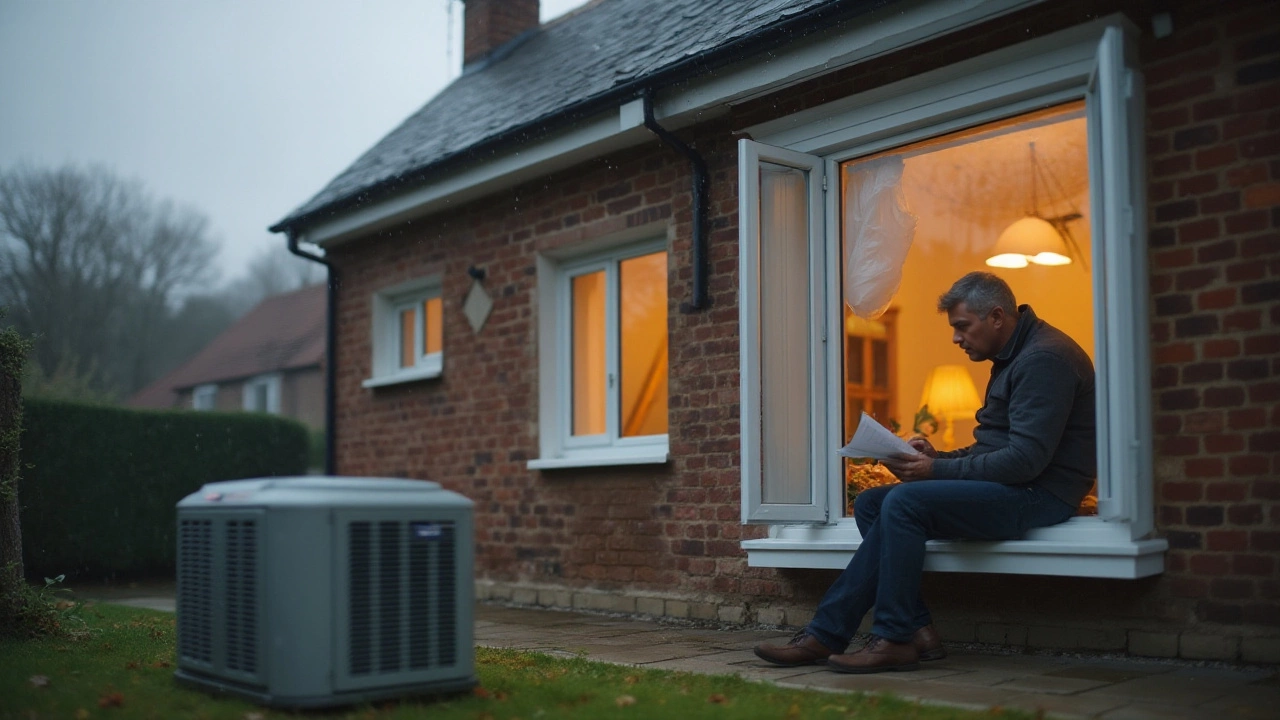Heat pumps have become a popular choice for households seeking efficient climate control, but like any system, they're not immune to issues. Understanding the most common problems, such as unusual noises or insufficient heating, can be crucial for maintaining their performance.
Homeowners often find themselves puzzled by sudden drops in efficiency or unexpected noises coming from their units. These issues might stem from something as simple as clogged filters or might require a more in-depth look by a seasoned professional.
Addressing potential malfunctions early can prevent a cascade of problems, ensuring your home remains comfortably warm during the cooler months. By grasping the basics of heat pump care and maintenance, you can extend the lifespan of your unit and perhaps even resolve minor issues on your own.
- Understanding Common Heat Pump Problems
- Troubleshooting Tips for Homeowners
- Maintenance and Preventive Measures
- When to Call a Professional Technician
Understanding Common Heat Pump Problems
In the world of home comfort systems, heat pumps are prized for their ability to both cool and heat your home efficiently. However, like any mechanical system, they come with their set of challenges. One prevalent issue revolves around the sudden realization that the pump isn't providing adequate heating. This can be perplexing, especially during a frigid spell, leading homeowners to wonder if their unit is up to the task. Poor heating can stem from several factors, such as low refrigerant levels, which directly impact the system's ability to transfer heat effectively. It's essential to remember that a heat pump requires a precise balance of refrigerant to function efficiently, and any imbalance could cause the system to underperform.
Another frequently experienced problem is strange or uncommon noises emanating from the heat pump. While it's not unusual for these systems to emit some sounds during operation, a new or particularly loud noise might indicate a deeper issue. Factors such as loose components, obstructed fans, or even a problem with the motor can lead to these unexpected sounds. A high-pitched whistle could suggest a refrigerant leak, which, apart from causing operational inefficiencies, can also pose environmental concerns. Addressing noise issues promptly is crucial not only for restoring optimal operation but also for ensuring longevity.
Many homeowners also deal with reduced airflow, which could make a room feel drafty or unevenly heated. A common culprit here is a clogged air filter, which restricts the smooth circulation of air through the system. Regular check-ups and timely replacements of air filters could be the simple remedy needed. However, blockages in the ductwork or problems with the blower might also be at play, necessitating a more detailed inspection. Obstructed airflow doesn't just affect comfort; it can force the unit to work harder, consuming more energy than necessary.
From thermostat issues, which could set the wrong temperature, to problems with the capacitor impacting the starting mechanism, the range of potential issues is diverse. As homeowners, being aware of these common problems equips one with the knowledge to either address minor issues independently or know when professional help is required. Having this understanding can not only save on repair costs but also extend the device's life. If there's one golden rule to adhere to, it's preventive maintenance, which can forestall many of these issues from arising.
Edgar Sandoval, a respected HVAC consultant, once noted, "The best way to address heat pump inefficiencies is regular maintenance. It's like brushing your teeth; simple upkeep can stave off gigantic issues later."
Given the breakthroughs in technology and the adoption of more sophisticated systems, many heat pumps today come equipped with diagnostics that can pinpoint issues early. Relying on this advanced feature can further aid in identifying the root cause of the problem, making it easier to take corrective measures. However, for those with older models, traditional methods of periodic checks remain invaluable. Regularly examining components, ensuring vents are unobstructed, and monitoring your energy bills for spikes are all excellent practices to maintain your system's health.

Troubleshooting Tips for Homeowners
Troubleshooting your heat pump problems doesn’t have to feel overwhelming. Before calling a professional, you can try a few strategic steps to diagnose and possibly rectify typical issues. The first area to check is the air filter. A clogged filter can significantly reduce airflow, impacting the system's ability to regulate temperature efficiently. If you've noticed reduced heating, it's worth inspecting the filter. Cleaning or replacing it could restore normal functioning without professional intervention.
Another aspect to consider is the outdoor unit. Debris such as leaves or branches can obstruct the outdoor coils, leading to inadequate performance. A periodic check and gentle cleaning of the unit’s exterior with a garden hose can ensure nothing is blocking the airflow. Remember, ensuring the unit has at least two feet of clearance all around is crucial for peak function.
If the system is producing strange noises, the problem might lie within the unit components. Loud or unusual sounds often indicate loose or damaged parts, such as fans or belts inside the system. While some noise might be normal, sudden scraping or rattling sounds should be investigated promptly. You might need to turn off the power and check the HVAC system's nuts, bolts, and screws. Tightening loose parts can sometimes be the simple fix you need to silence a noisy pump.
Thermostat settings can also be a source of problems. Ensure your thermostat is correctly set to the heating or cooling mode as per your need. Misconfigured thermostats can cause the system to behave erratically. For digital thermostats, a quick reset can sometimes resolve minor glitches. Adjacent to thermostat issues, ensure your system hasn't accidentally been switched to 'emergency heat', especially when heat is not particularly needed.
“Routine checks and maintenance of cleaning the air filter, inspecting the coils, and ensuring the thermostat is set correctly can preempt many common heat pump issues,” advises Anna Stevenson, an HVAC specialist. She emphasizes that a little maintenance can save significant repair costs.
Lastly, circuit breaker checks are an easy yet often overlooked step. The home heating system can sometimes trip the breaker if it’s overloaded. Ensure your breaker is in the correct position. A simple reset can sometimes bring your system back online without much fuss. Remember, repeated tripping could indicate a bigger issue that may need professional attention.

Maintenance and Preventive Measures
Regular upkeep of your heat pump is crucial to ensure it operates efficiently and effectively throughout its lifespan. One of the most effective ways to extend the life of your system is through consistent maintenance. A vital step in this process is checking and replacing air filters on a monthly basis. Dirty filters can restrict airflow, forcing the system to work harder, which could lead to premature wear and tear. When replaced regularly, you improve both air quality and the system's energy efficiency.
Don't overlook the outdoor unit either. It's exposed to the elements and can accumulate debris like leaves, dirt, and snow. Clearing this debris can prevent airflow obstruction, ensuring that the outdoor component functions properly. In regions with heavy snowfall, it's advisable to clear snow around the unit to maintain airflow and prevent damage to the fan blades.
Another essential maintenance task involves the cleaning of coils, both evaporator and condenser types. Dirty coils can drastically reduce the efficiency of the heat pump, making it struggle to maintain the desired temperature in your home. To ensure optimal performance, clean these coils at least once a year or as required based on the manufacturer's recommendations. Coil cleaning helps maintain the system's heat transfer capacity, effectively keeping your home comfortable.
Inspecting and Servicing Components
Periodic inspections by a qualified technician can also significantly prolong the life of your heat pump. It’s not uncommon for homeowners to miss subtle signs of component wear or electrical issues. A technician can provide a thorough check, including inspecting refrigerant levels, ensuring correct thermostat operation, and verifying the integrity of electrical connections. Such meticulous checks prevent minor issues from escalating into costly repairs.
An often overlooked but effective measure is the calibration of the system’s thermostat. Ensuring your thermostat is accurate adds another layer of operational efficiency. An incorrect thermostat can lead to the system overworking or cycling too frequently, which can add unnecessary strain on components.
According to the Energy Efficiency and Conservation Authority, "Frequent maintenance checks ensure your heat pump delivers the highest level of performance, reducing energy consumption and preventing avoidable breakdowns."
This holistic approach to managing your heating system saves money on potential repairs and prolongs the overall lifespan of the equipment. As the frequency of service calls drops due to regular checks, you get to enjoy peace of mind knowing that your home will remain warm and inviting, even as the seasons change.
Seasonal Maintenance Checklist
- Check and replace air filters monthly
- Keep the outdoor unit free of debris
- Clean the evaporator and condenser coils annually
- Schedule regular professional inspections
- Calibrate the thermostat for accuracy
Engaging in these preventive measures paves the way for a reliable, efficient heat pump system capable of providing comfortable living conditions throughout the year. Simple actions such as the ones listed might seem small but can collectively lead to substantial improvements in system performance and energy savings.

When to Call a Professional Technician
As dependable as heat pumps can be, there are times when their operation goes awry, leaving homeowners in a bind. While some troubleshooting can be handled independently, specific situations warrant the expertise of a seasoned professional. One major sign is when your HVAC system fails to provide adequate heating or cooling despite being set to the appropriate temperature. This often points to underlying issues like a failing compressor or refrigerant leaks, which aren't easily resolved without the right training and tools.
Another common scenario requiring professional attention is strange noises emanating from the unit. While minor hums may signify something as innocuous as a loose bolt, persistent grinding or squealing noises might indicate more severe mechanical issues. Delaying repair can exacerbate the damage, potentially leading to expensive replacements. It's also worth noting that handling refrigerant-related problems without proper certification can be both illegal and hazardous, reinforcing the need for professional intervention.
Power disruptions or recurrent system cycling also signal the need for expert analysis. These issues might be tied to faulty electrical connections or malfunctioning thermostats, both of which necessitate careful handling. Consistently skyrocketing energy bills despite moderate usage is another red flag. Professionals can perform detailed diagnostics to pinpoint inefficiencies and suggest optimal solutions. A proactive approach can prevent further damage and ensure your system operates efficiently.
Another crucial consideration is maintenance. Regular check-ups performed by experienced technicians can significantly extend your heat pump's lifespan. They're trained to spot early signs of wear and tear, address minor faults before they escalate, and provide tune-ups to keep the system working smoothly. As per a statistic from the Environmental Protection Agency, regular maintenance can cut energy use by up to 15%, translating into considerable savings over time. This emphasizes the value of scheduling periodic professional inspections.
